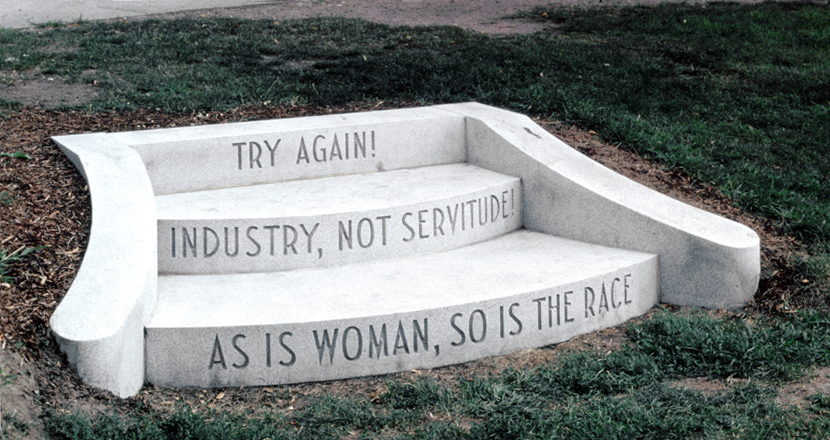‘Industry, Not Servitude’
The following essay was written in 2005 for the Sunrise public affairs radio program of WUML-FM at UMass Lowell. The weekday morning show was broadcast for a few years under the guidance of executive producer Chris Dunlap. I was reminded of the essay by this week’s news reports about August 26 being the 93rd anniversary of the signing of the law that provided for full voting rights for women in the United States.—PM
.
Industry, Not Servitude: Good Hard Words
I watched the Golden Globes award ceremony on TV last Sunday night. One of the honored films was Iron-Jawed Angels, the story of American women fighting to gain the right to vote. The scenes reminded me of some of the strong women who made their mark in the history of Lowell and the nation. There’s a sculptural tribute to the same kind of women leaders in Lucy Larcom Park, which runs from Merrimack to French Street, between the two main buildings of Lowell High School. The artwork is out of the way, so many people may not have seen it or realized what it was about when they passed by. Artist Ellen Rothenberg, now living in Chicago, named her sculpture … Industry, Not Servitude. She created the sculpture to recognize the women workers in nineteenth century Lowell who struggled together to improve conditions in the factories and demanded fair treatment from their employers.
“Try Again,” “Stick to Your Text,” “Thy Sister’s Keeper Know Thou Art!” “Truth Loses Nothing . . . Upon Investigation”— these and other statements of belief and advice are cut into the stone and steel markers of Ellen Rothenberg’s multi-piece sculpture in Lucy Larcom Park along the Merrimack Canal. The visual and verbal information exists in a permanent “pause” ready to release its meaning to the next viewer moving through a slim landscape in the middle of downtown. What we find there is language caught in granite and metal—a curved bench, a set of stairs, a fence circling a tree—and each one of us activates the sound as we encounter the various pieces. This is an artwork grounded in a time and place that can only be Lowell. The voices are pulled from the historic air, lifted from the dry papers filed in archives. Voices stopped in full-throated command or cry or unsentimental statement.
Those words were not necessarily much heard, never mind heeded, in their time because they rose from marginal sources: women, poets and writers, workers, union organizers. Now, we fast-forward 160 years, and see words that had been spoken or printed on paper all stony and strong—here today and still there tomorrow.
The artful shapes and preserved language are part of the daily experience of the community, like doorways, sirens, street lamps, and bench talk. In Lowell’s small but lively downtown, the historic district is drawn to reveal a slice-of-nineteenth-century-life, from factory and church to boarding house and manager’s residence. Integrated into this living exhibit of the process and results of industrialization are several large-scale sculptures that act as visual commentaries on the city’s heritage.
Only one other work employs language— a plaza with polished granite columns inscribed with book excerpts (the Jack Kerouac Commemorative by Ben Woitena of Texas) that honors native-son Jack Kerouac. This sculptural work anchors a literary festival each fall. Other works in the Lowell Public Art Collection include the figurative canal-builder—The Worker by the Schwartz brothers of New York City—that for years served as a backdrop for a regular public report on worker safety and a monumental bronze “mill-girl” grouping, Homage to Women by Mico Kaufman of Tewksbury, which has become a local icon like the Minute Man in Lexington or the Fisherman in Gloucester.
Ellen Rothenberg’s sculpture, with its long, linking form, closes the loop on the city’s sculpture trail. Historical-park rangers use it to help retell the Lowell story to visitors and students. The artwork’s deep content makes it an ideal place for activity tied to the city’s annual women’s history conference as well as the women’s week celebration involving the community and participants from UMass Lowell.
Sculptor Ellen Rothenberg gave some of Lowell’s own past good words back to the community. She also commemorated two important persons: author and poet Lucy Larcom and labor activist and writer Sarah Bagley. Although the park is named for Larcom, the park had no sign or marker recognizing her, and Bagley had vanished to parts unknown. This sculpture, titled Industry, Not Servitude, has become part of the city’s dialogue, part of what we say about ourselves every day.
.
—Paul Marion, 2005
A detail from Ellen Rothenberg’s sculpture in Lucy Larcom Park (photo by B. T. Martin, courtesy of ellenrothenberg.com)
